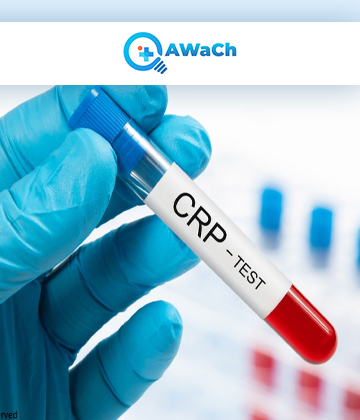CRP Test
CRP test refers to the measurement of C-reactive protein (CRP) levels in the blood.
During these inflammatory conditions, C-reactive protein (CRP Test) levels can experience rapid and substantial increases, rendering it a valuable marker for evaluating and tracking various medical conditions.
Healthcare professionals commonly conduct C-reactive protein (CRP) testing using a blood sample.
There are different methods available for CRP measurement, including high-sensitivity CRP (hs-CRP) tests, which can detect even lower levels of CRP associated with cardiovascular risk. C-reactive protein testing is primarily used in the following ways:
What is CRP Test ?
1. Diagnosis and Monitoring of Inflammatory Conditions: Elevated CRP Test levels can signify the existence and severity of various inflammatory conditions, including infections, autoimmune diseases (such as rheumatoid arthritis and lupus), and inflammatory bowel disease. CRP can help in diagnosing these conditions and monitoring their progression or response to treatment.2.
When assessing cardiovascular risk, elevated CRP have been linked to an escalated likelihood of developing cardiovascular diseases like coronary artery disease, heart attack, and stroke. The measurement of hs-CRP can serve as a complementary tool alongside other risk factors, such as cholesterol levels and blood pressure, to evaluate an individual’s comprehensive cardiovascular risk.
2. Assessment of Cardiovascular Risk:Elevated CRP have linked to a heightened risk of cardiovascular diseases, encompassing coronary artery disease, heart attack, and stroke. Incorporating hs-CRP measurements as a supplementary assessment, along with other risk factors like cholesterol levels and blood pressure, helps evaluate an individual’s comprehensive cardiovascular risk.
3. Monitoring Response to Treatment: Medical professionals can employ CRP to monitor the efficacy of treatment for specific conditions. For instance, in cases of infections or inflammatory diseases, observing a reduction in CRP over time could suggest a favorable response to therapy.
4. Prognostic Indicator: In certain instances, researchers have linked increased disease severity and a less favorable prognosis to elevated CRP. C-reactive protein aids in the stratification of risks and the prediction of outcomes for conditions such as sepsis or specific cancers.It

CRP Test, short for C-reactive protein testing, is a diagnostic procedure that involves the measurement of C-reactive protein (CRP) levels within the bloodstream. C-reactive protein is a protein produced by the liver in response to inflammation in the body. During various inflammatory conditions, CRP levels can rapidly and significantly rise, making it a valuable biomarker for assessing and tracking a wide range of medical conditions.
Healthcare professionals typically perform CRP testing using a blood sample obtained from the patient. Several methods are available for CRP measurement, including high-sensitivity CRP (hs-CRP) tests, which are capable of detecting even lower levels of CRP associated with cardiovascular risk. CRP testing serves various critical purposes in healthcare:
Strength:
The strength of CRP Testing lies in its versatility and clinical utility. It plays a pivotal role in the diagnosis and monitoring of inflammatory conditions, providing valuable insights into the existence and severity of diseases such as infections, autoimmune disorders (e.g., rheumatoid arthritis and lupus), and inflammatory bowel disease. By assessing CRP levels over time, healthcare professionals can monitor disease progression and evaluate the effectiveness of treatment.
Advantages:
CRP Testing offers several advantages in the realm of healthcare. It is an essential tool for diagnosing and monitoring inflammatory conditions, allowing for timely intervention and improved patient care. Additionally, when assessing cardiovascular risk, CRP has been linked to an increased likelihood of developing cardiovascular diseases such as coronary artery disease, heart attack, and stroke. High-sensitivity CRP (hs-CRP) measurements provide a complementary means of evaluating an individual's overall cardiovascular risk, alongside other risk factors like cholesterol levels and blood pressure. CRP testing is also instrumental in monitoring the response to treatment, aiding in the assessment of therapeutic efficacy. Furthermore, it serves as a prognostic indicator, assisting in risk stratification and outcome prediction for conditions like sepsis or specific cancers.
Recognitions:
CRP Testing has gained recognition and widespread use within the medical community for its diagnostic and prognostic capabilities. It is an integral part of the diagnostic process, assisting healthcare professionals in making informed decisions about patient care. The interpretative value of CRP levels, when considered alongside clinical evaluation, medical history, and other laboratory or imaging examinations, underscores its importance in modern medicine.
Innovation:
While CRP Testing itself is not a novel innovation, ongoing advancements in laboratory technology and diagnostic methodologies continue to enhance its accuracy and clinical relevance. High-sensitivity CRP (hs-CRP) tests, for instance, have expanded the scope of CRP testing by enabling the detection of lower CRP levels associated with cardiovascular risk. These innovations align with the commitment of the medical community to improving diagnostic tools and patient outcomes.
